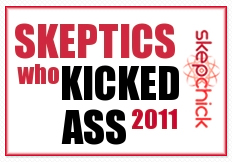This morning I was alerted to two very different headlines – in as much as they say the opposite – for the very same story.
This concerns a news story about a Phase III drug trial for Alzheimer’s Disease (AD), the results of which were announced at a conference. (I have more to say about this in a moment).
So the first headline screams, “TauRx Alzheimer’s Drug LMTX Fails in Large Study Although Some Benefit Seen.” The second headline comes from opposite land and declares, “Unprecedented Alzheimer’s drug slows disease by 80 per cent.”
So which is it New Scientist and NBC News?
This trial can be fairly classified as a FAIL since the original hypothesis was not met. Doing a post-hoc analysis after the fact and finding a group of people for whom it did benefit is interesting and may stimulate further research, but is not enough to say the trial was a success.
Now clear. Doesn't work, except in post-hoc identified 15% not on current AD meds. Another failure, I'm afraid. https://t.co/RLS8wphg7g
— Robert Howard (@ProfRobHoward) July 27, 2016
Post-hoc analyses can be revealing (have published from own trials), but best to come clean about overall failure. https://t.co/cXDzLhl9zK
— Robert Howard (@ProfRobHoward) July 27, 2016
It seems that of the 891 subjects in the Phase III trial, fifteen percent of them were not taking any other drugs to treat Alzheimer’s. In this group, LMTX alone reduced the rate of decline in cognitive and functional skills by 85 percent. But, in the patients who were already taking some kind of medication, LMTX showed no benefit at all.
The researchers state they are puzzled by this and are still trying to figure out why current medications seemed to block the effect of LMTX. I’m unable to get anymore information at this point as these results were presented at a conference. For this reason, we also need to be cautious, since the study has yet to pass through the rigours of peer review.
But, this is interesting for several reasons.
One being that despite billions of dollars bring spent by Big Pharma on drugs for AD, as yet nothing has shown efficacy.
One study showed that between 2000 and 2012, 244 compounds were tested in 413 clinical trials. Only one was approved for use, a failure rate of 99.6 percent. This has led to researchers to look to prevention as a way to manage AD (COI declaration, my lab works on a compound that may show efficacy in this area).
Also, cases of AD will only increase with an ageing population and this is happening worldwide.
In the US for example, AD is currently the No. 6 cause of death. More than 5 million Americans have been diagnosed with the condition, with that number projected to nearly triple to 14 million by 2050. In December 2015, Congress pledged a $350 million increase for research on AD, an amount that could boost efforts to find an effective treatment by 2025.
So, whilst we desperately need AD drugs, it appears it’s too early to say if LMTX might be one. And these news headlines just add to the confusion.
Update: July 27, 1631. Ben Goldacre has lost his shit over this and rightly so. A Simple Google search show many news outlets have got this right but many more have got it oh so wrong. See below for the Time front page.
Thursday's Times: "Scientists create the first drug to halt Alzheimer's" (via @suttonnick) #tomorrowspaperstoday pic.twitter.com/8aMRYDrL1e
— BBC News (UK) (@BBCNews) July 27, 2016
When Goldacre calls them out, he’s met with this… baffling
you have misrepresented an RCT with a negative result as having a positive result, on the front page of the Times. https://t.co/O2mHAVblLR
— ben goldacre (@bengoldacre) July 27, 2016
@bengoldacre yes. But aim is not to summarise RCT. It is to point out there are signs of progress. You are confusing two different things.
— Chris Smyth (@Smyth_Chris) July 27, 2016
UPDATE: July 28th, 2016 0907
New Scientist have now corrected the headline and issued an amendment to their previously incorrect piece.








